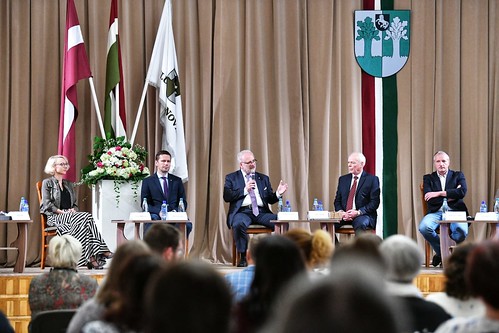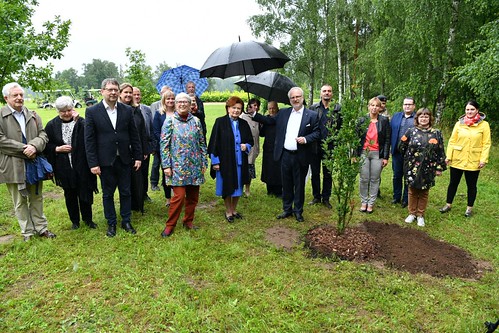‘This in a way is a historic moment. We are witnessing a resurgence of Selonian identity as we have this debate at the national level. This is a turning point for exploration of Latvianness, which existed only in one plane in the Soviet era. It was flat and basically stripped of everything to avoid Latvianness becoming strong-rooted. Now, three decades on from restoration of national independence, we are entering a new phase where our national awareness urges us to nurture our identity as we choose to. That is crucial because we belong to Europe and are a part of the world where each country and nation has its own place marked by its unique characteristics and identity. Sense of belonging makes people take care of their country. Sense of personal responsibility for development and progress of the state is crucial in democracy,’ said President Levits opening of the discussion.
Discussion started with introductory remarks of President of Latvia Egils Levits, Chair of the Ilūkste Regional Council Stefans Rāzna, Member of the Board of Stenders’ Society Pēteris Stradiņš and member of the Society Laura Dimitrijeva, historian, Chief Editor of National Encyclopaedia Valters Ščerbinskis, writer and poet Inese Zandere who talked about unique features of Sēlija that distinguish it among other Latvian regions from their particular perspective. For example, President Levits mentioned that ‘Selonians belong to one of the five ancient Latvian nations with its own special dialect’. Chair of the Ilūkste Regional Council Stefans Rāzna stressed: ‘Sēlija is not a fiction. Sēlija is real. Sēlija is part of Latvia. It is unlike Zemgale, Kurzeme or Latgale. It is Sēlija. Sēlija is a historical land that can play a similarly important role to, for example, Valka and Valga, in relationship between Latvia and Lithuania.’ Poet Inese Zandere mentioned that ‘Sēlija is a land that embraces cultures, brings together’. One of the local ladies added that one of the main traits of Sēlija is its small communities.
While discussing identity, Laura Dimitrijeva, an active member of Stenders’ Society, emphasised that ‘our identity is shaped by the place where we have lived for a longer time’, and Inese Zandere said that ‘place names carry a lot of information about identity’.
President Levits underlined that the legislative proposal on cultural and historical Latvian lands that he is planning to present to the parliament this September will emphasise the dimension of Latvianness in local identities and strengthen people’s sense of belonging to particular Latvian land because Latvia formed as a result of uniting Latvian lands. Law will also encourage people to engage more actively in preserving their identity because identity cannot grow without people who accept it and nurture it. Law will also specify obligations of the state to financially support the development of historic regions. ‘This law will significantly deepen the understanding of Latvianness in our minds. Latvianness has several historic layers. All of them form what we know as Latvianness today,’ said the President.
Mr Stradiņš noted that ‘if the law is passed, it will be a major push for further development of Sēlija’.
The following discussion with local inhabitants focused on practical outcomes of the regional reform. Selonians expressed their concerns about administration, education, decision-making, infrastructure development, business and other issues. Discussion then switched to electoral alliances; a question added to discussion by Egils Levits. According to President of Latvia, although parliament rejected the idea for some time, the law on elected representatives of local communities will be prepared eventually. ‘People want to take care of their surroundings, their physical environment, irrespective of how far or near to Riga they live. Communities should have their democratic voice,’ underlined Egils Levits.
Before saying good-bye to participants, President concluded: ‘It has been a real honour to discuss identity, regional reform and other topics with you. It is very important for me to know what each Latvian resident thinks about issues that we all care about to be able to find the best solutions together.’
During his visit to Sēlija, Egils Levits went to Tadenava Rainis’ Museum in Jēkabpils region and ABC trail opened in 2014 in Sunākste to mark the 300th birthday of Old Stenders. He also visited Stenders’ Family Grave. President of Latvia also stopped by biological farm ‘Liepas’ in Aknīste region. Before going to Sēlija, President of Latvia Egils Levits and the sixth President of Latvia Vaira Vīķe-Freiberga visited the Garden of Destiny to plant oaks of wishes and mark the 15th Anniversary week of Koknese foundation, which started the Garden of Destiny.
President of Latvia Egils Levits visits Sēlija
President of Latvia Egils Levits and the sixth President of Latvia Vaira Vīķe-Freiberga visit the Garden of Destiny






